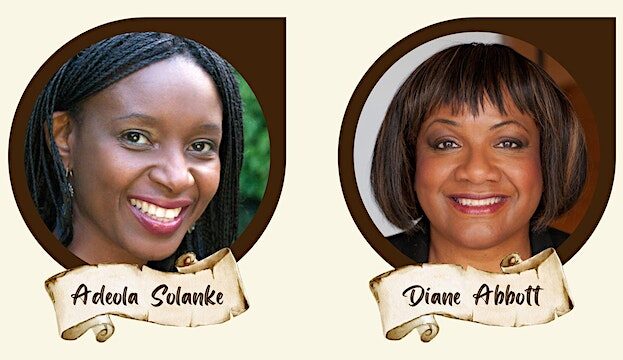
Celebrating a tale of creativity and resistance with award-winning playwright, Ade Solanke in conversation with Diane Abbott.
Phillis Wheatley was born in Africa (most likely in Senegal) in 1753 or 1754. When she was about 7 years old, she was kidnapped and brought to Boston, USA. There, in 1761, John Wheatley enslaved her as a personal servant for his wife, Susanna. As was the custom of the time, she was given the Wheatley family’s surname.
Her circumstances allowed her time to learn and, as early as 1765, to write poetry. She came to London in the Summer of 1773 to publish her debut poetry collection. ‘Reflections of Various Subjects, Religious and Moral. The 19-year-old prodigy toured London in June and July, entering the vivid Georgian London world of Africans such as Ignatius Sancho, Ottobah Cuaguano, Dido Bele, Equiano Oluadah, and others. She became the toast of the town, feted by the political and cultural elite.
Phillis’ writings about politics and freedom from colonial oppression (coded arguments for liberation from slavery) made her the Poet Laureate of the American Revolution. Her erudition disproved racist notions about European intellect. After her life-changing London visit, Wheatley secured her freedom.
Join us to celebrate this tale of creativity and resistance with award-winning playwright, Ade Solanke, whose original new play, Phillis in London, dramatises and re-imagines Wheatley’s experience as an African Woman writer abroad in Georgian London, ‘celebrated’ by the elite of the capital of the British empire at the height of the Transatlantic Slave Trade. She’ll be joined by Diane Abbott to explore the landscape of African-Georgian London.
ADEOLA SOLANKE
Adeola Solanke is an award-winning playwright and screenwriter, and founder of Spora Stories, telling the stories of the African diaspora. Her plays include her acclaimed debut, Pandora’s Box, which won a Best New Play nomination in London’s Off-West End Theatre Awards. Her play, The Court Must Have a Queen, about Henry V111’s relationship with Tudor African trumpeter, John Blanke, was performed in the Great Hall at Hampton Court Palace.
A double Fulbrighter, she was a 22/23 Fulbright All Disciplines Distinguished Scholar at Emerson College, and was formerly a Fulbright Fellow, Phi Beta Kappa International Scholar, and Association of American University Women Scholar at USC.
Adeola has a BA Hons in English Literature from the University of Sheffield, winning its Distinguished Alumni Award in 2016. She’s written for the BBC, The Guardian, The Times Literary Supplement, Art Monthly, The Voice, West Africa Magazine and others. A Hawthornden Fellow, she was also a founding Fellow of the Royal Literary Fund, and its first British Film Institute Writer in Residence. Ade has run playwriting programmes at the Royal Court, Soho and Arcola theatres in London, and taught screenwriting at the University of London, and in Nigeria, Ghana, Zimbabwe. She was a judge for the South African Writers Guild Awards and the UK’s Royal African Society Baobab Film Award. She lectures in dramatic writing internationally.
DIANE ABBOTT
In 1987 Diane Abbott made history by becoming the first black woman ever elected to the British Parliament. She has since built a distinguished career as a parliamentarian, broadcaster and commentator.
From the outset of her career, Diane has championed global justice, human rights, peace and security issues at home and abroad.
From 2015 to 2019 Diane Abbott was a prominent member of the Labour Party’s front bench, serving as the Shadow International Development Secretary, then Shadow Secretary of State for Health, and finally Shadow Home Secretary from 2016. In the last general election Diane was re-elected as the Member of Parliament for Hackney North and Stoke Newington with a landslide majority.
